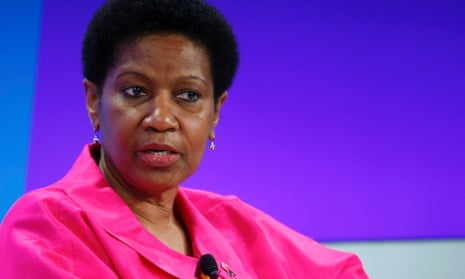Countries around the world should use social media and better data to close the equality gap between men and women, according to Phumzile Mlambo-Ngcuka, former deputy president of South Africa and head of UN Women, who launched the UN’s hugely successful HeForShe campaign – the latest phase of which was launched by actor Emma Watson at the World Economic Forum annual meeting in Davos in January 2015.
Mlambo-Ngcuka, who did a PhD in mobile technology after leaving office, said technology is integral to making the world a better place. “By the time I went to work at UN Women, I was very clear that technology was going to be part and parcel of what I’m going to use to reach out to both men and women in the world, for them to be part of trying to solve the problems,” she said.
The HeForShe campaign aims to mobilise 1 million men and boys to support gender parity. “Even if you are already a male activist, it’s good to be part of that because then you could be a role model to other men,” said Mlambo-Ngcuka. “As a result of joining HeForShe, you hold yourself to an even higher standard.”
Speaking after taking part in a session on gender inequality in Davos, Mlambo-Ngcuka welcomed progress on gender parity, but expressed frustration about the speed of change, which was due in part to a lack of funding and status on the issue. “In all countries, the women ministry is the less funded and less prestigious ministry,” she said. “That does not assist those people who are deployed to work there, to do the kind of work that they’re supposed to do. It’s a huge mandate with a very small budget.”
But Mlambo-Ngcuka said there were some hopeful signs, including better data collection over the past 15 years, enabling campaigners to measure progress and see where there are gaps that still need closing.
She believes leadership is vital in addressing gender parity. “I have been a minister. When the president wants it done, you know it and you get it done. You therefore do need this leadership and that is why it’s important when we talk about gender equality; not just to think about the women and the women’s movement as the only people with the responsibility,” she said. “It is a societal responsibility but more than anything else, leaders are there to protect citizens. Leaders are there to protect their people’s human rights. Women’s rights are human rights.”
She also agreed with co-panellists Erna Solberg, prime minister of Norway, and philanthropist Melinda Gates on the need to combat poverty by putting money into the hands of women.
“When women have economic means, which in many cases is also assisted by education, the children in those women’s lives become better. From generation to another, in the same family, you literally stop poverty,” she said. “One family at a time … one woman at a time we can actually, significantly decrease poverty, which is why it is important to make that distinction about investing in women in education, because it has that longevity that you actually see in society.”
Mlambo-Ngcuka also said it is now much easier to make this kind of targeted investment, as well as better education, through modern technology. She said culture was too often used as an excuse not to change practices that harm women and girls. “Culture is not invincible,” she said, adding that countries around the world, including South Africa, need to create ways for culture to be challenged and ensure there are consequences from harmful practices.
“The tolerance for crimes against women in South Africa and in many other countries in the world continues to be a problem. Once society reaches a point where there is violence against women – where there is a violation of rights – everybody rises up and we have zero-tolerance,” she said. “We definitely need to get our act together much better in South Africa. Pockets of government are working hard but there’s big room for us to improve.”
More from Davos:
Punishing the rich is not the answer to inequality, warns top economist
World leaders ‘failing on social cohesion’
Bold ideas for a better world from Davos and beyond
Sign up for your free weekly Guardian Public Leaders newsletter with news and analysis sent direct to you every Thursday. Follow us on Twitter via @Guardianpublic

Comments (…)
Sign in or create your Guardian account to join the discussion